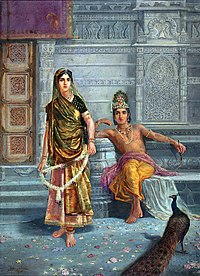Gopi

Gopi (गोपी) is a Sanskrit word originating from the word Gopa. In Hinduism especially, the name Gopika (feminine form of Gopi) is used more commonly to refer to the wives of Gopa of Braj.
Gopis are famous within Vaishnavism for their unconditional devotion (Bhakti) to Krishna as described in the Bhagavata Purana and other Puranic literature. According to Indian philosopher, Jiva Goswami, gopis are considered as the eternal beloved and manifestation of his internal spiritual potency. Among the gopis, Radha is the chief gopi and is the personification of bliss potency (hladini shakti) of Krishna. She alone manifest the stage of "Mahabhav" or supreme love for Krishna and holds a place of particularly high reverence and importance in a number of religious traditions.[1]

Prominent gopis[]

The Gopis of Vrindavan are total 108 in numbers. They are generally divided into three groups: Gopi friends of the same age as Krishna; maidservants; and gopi messengers. The first group are the most exalted (Varistha), Krishna's contemporary gopi friends, the second group are the maidservants and are the next most exalted (Vara), and the gopi messengers come after them. The varistha gopis are more famous than all the others. They are eternally the intimate friends of Radha Krishna. No one can equal or exceed the love they bear for the divine couple.[2] The primary nine gopis are considered the foremost of Krishna's devotees after Srimati Radharani. Their names are as follows:
- Radha (chief gopi, Krishna's favourite)
- Lalita (gopi) Sakhi
- Vishakha Sakhi
- Champakalata Sakhi
- Chitra Sakhi
- Tungavidya Sakhi
- Indulekha Sakhi
- Rangadevi Sakhi
- Sudevi Sakhi
Unconditional love[]
According to Hindu Vaishnava theology, the stories concerning the gopis are said to exemplify Suddha-bhakti which is described as 'the highest form of unconditional love for God' (Krishna). Their spontaneous and unwavering devotion is described in depth in the later chapters of the Bhagavata Purana, within Krishna's Vrindavan pastimes and also in the stories of the sage Uddhava.
See also[]
- Chaitanya Mahaprabhu
- Gita Govinda
- Six Goswamis
- Holy Basil (Tulsi)
- Maenads
References[]
- ^ Francis Bryant, Edwin (2007). Krishna: A Sourcebook. United States of America: Oxford University Press. p. 382. ISBN 978-019-514891-6.
- ^ [1]
External links[]
| Wikimedia Commons has media related to Gopis. |
- The Residents of Eternal Vrindavana (including Srimati Radharani & the Gopis)
- The Eight Main Gopis (Asta Sakhis)
- Deity Gallery: Radha-Madhava & the Eight Gopis
- Diagram of the Yoga Pitha in Vrindavana
- Srimati Radharani and other Personalities
- People related to Krishna
- Culture of Uttar Pradesh
- Consorts of Krishna

